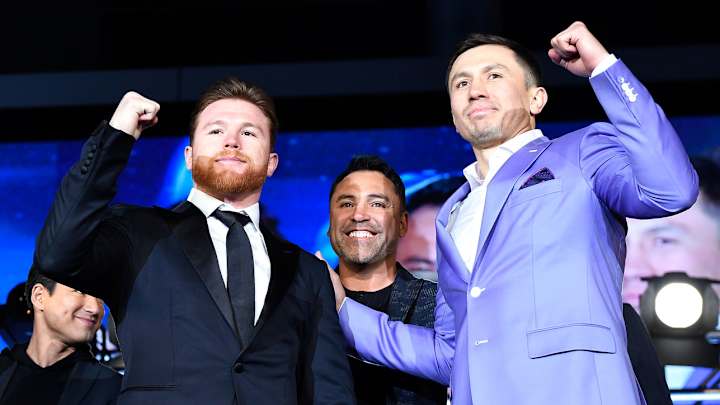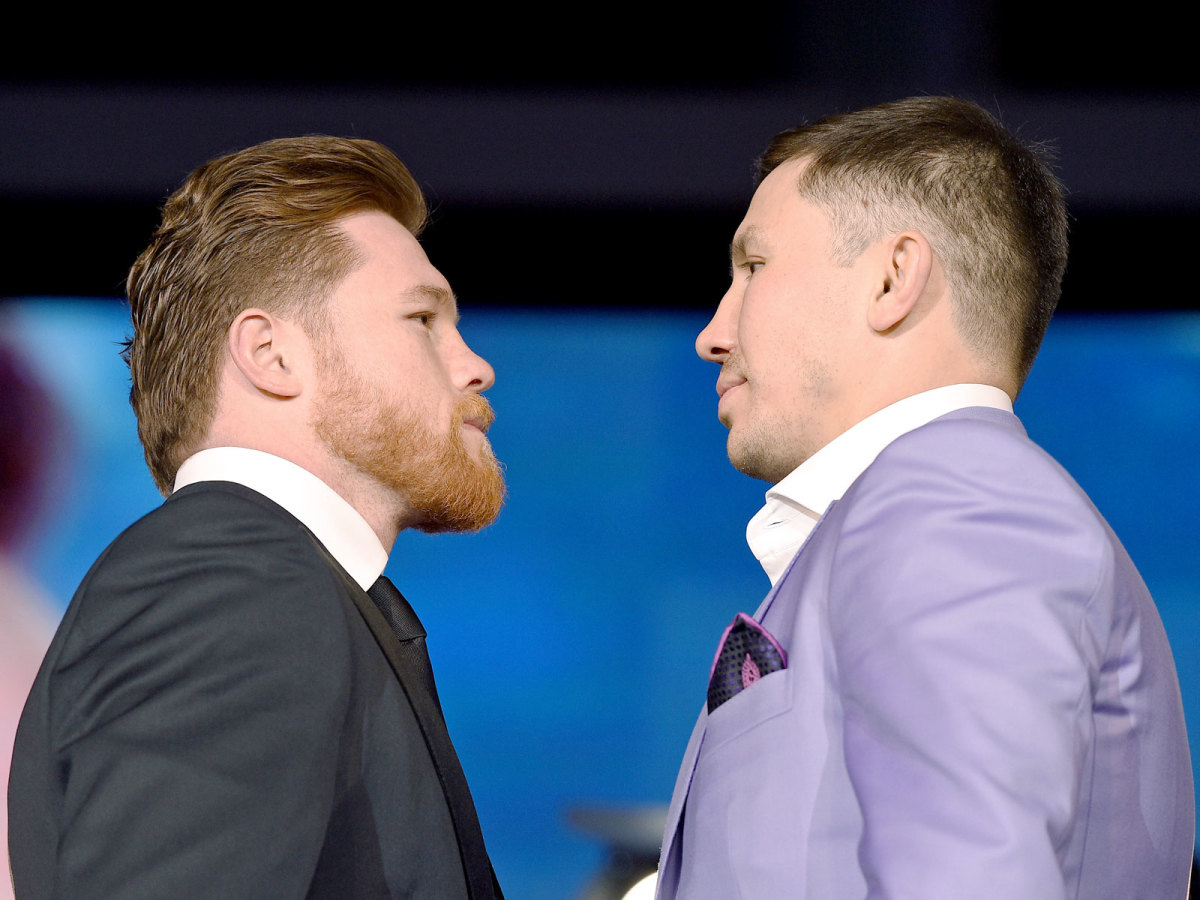Why the Usually Quiet Gennady Golovkin Is Hellbent on Vanquishing Canelo Alvarez in Their Rematch

SANTA MONICA, Calif. – The afternoon started like a joke. Knock, knock, came the sound from the door to home of the boxing promoter Tom Loeffler. “Who’s there?” he wondered aloud.
The answer: boxing’s most underappreciated champion, Gennady “GGG” Golovkin, he of the 20-straight middleweight title defenses, the 38–0–1 record, the 34 knockouts and the surefire Hall of Fame career. On Saturday, Golovkin will climb into a boxing at T-Mobile Arena in Las Vegas to settle his, ahem, beef with Saul “Canelo” Alvarez (49-1-2, 34 knockouts) in their anticipated rematch.
Golovkin had knocked on that door a few weeks earlier before entering in typical fashion. He was relaxed, he was smiling, and for a minute those gathered could almost forget that he’s not only a boxer but one of the most devastating boxers in the history of the sport. That was always part of Golovkin’s charm: How disarming he was, how he never seemed ruffled, how he always said things like “He is nice boy; I will crush him”—and then went into the ring and delivered just like that. His brutality always contrasted with his low-key personality. He was boxing’s happiest, nicest world champion, a contradiction, like Ned Flanders with knockout power.
As if he wanted to bolster that notion, Golovkin spied the white Air Jordans on Loeffler’s feet. “Tom!” he said, not missing an opportunity to pump one of his sponsors. “Nice shoes!” They shook hands. Embraced. Then Golovkin sat down on the orange couch in the living room, opposite a framed picture of that epic shot of the heavyweight champion Muhammad Ali standing over a knocked out Sonny Liston, his fist cocked and mouth agape. Golovkin wore a Hublot watch with GGG carved into the face. The company, another sponsor, had only made 100 of them. Then he started to discuss Alvarez: the last two years, the controversial split draw in their first meeting, the positive drug tests, the rancorous promotion for the rematch, all of that. A few minutes in, his smile had vanished.
So continued what had previously been thought impossible: a promotion in which Golovkin had dispensed with his usual politeness and swapped in some righteous anger. It was refreshing, actually. It was also obvious to those in attendance at the promotional shoot for the rematch in July. The mood was so tense some worried the boxers might actually come to blows.
Golovkin grimaced on the couch as he lays out his complaints through an interpreter, occasionally answering in English. “What really upsets me is he’s this great champion and all of a sudden he starts with these lies,” Golovkin says. “He looks like a liar. He’s making statements about contaminated meat, these excuses, and then he’s eating kebabs. He doesn’t care what people think. He could have been a real man. Said, I made a mistake. But he didn’t do that. He still wanted to make a fool out of people. Nobody believes him.”
So how does Golovkin really feel? He grimaced again. “He looks like a first-grade kid who was caught, and he didn’t know what to say,” he continued. “He says all these stupid things. He’s a fake. He shows a lack of respect. For boxing. For sports.”
Golovkin will allow that the rematch marks his “most important fight to date.” Lost in all the back-and-forth is that should Golovkin defeat Alvarez he would set a record for consecutive middleweight defenses, topping the mark established by Bernard Hopkins. Golovkin said he never thought seriously about that record, never considered the historical implications there. “Never some super heroic thing,” he said. But even then, Hopkins works with Golden Boy Promotions, the company that promotes Alvarez, and to beat them and break Hopkins’s record, well, “It’s like a bonus,” Golovkin says.

The last time Golovkin stated that he wanted to punish an opponent, he rained blows on the midsection of Curtis Stevens in Nov. 2013 like Rocky in that meat locker. It hurt to watch. Stevens retired, probably wishing he’d been more polite to Golovkin in the lead-up. Alvarez is a more popular boxer than Stevens and a more accomplished one. But Golovkin will not cede him even that. “There was nothing special about him in our first fight,” he said on that orange couch.
About that: after years of negotiations that never led to an actual contract, Golovkin made several concessions to Alvarez to get the contract done. Golovkin agreed to these stipulations despite the widespread but arguable notion that he held the more impressive résumé. Their first bout, in Sept. 2017, resulted in a split draw that was controversial, mostly because most ringside observers had Golovkin winning, many by comfortable margins. As he leaned forward on the couch, he compared the decision to landing on 0 or 00 in roulette. “The judges, they killed the sport that night,” he said.
Negotiations for the rematch spilled into 2018, and even when the two sides reached an agreement, the second bout fell apart when Alvarez tested positive for Clenbuterol. He blamed contaminated meat in Mexico before being suspended for six months by the Nevada Athletic Commission. Golovkin chose to box anyway, knocking out Vanes Martirosyan at the StubHub Center in Southern California on May 5. The fight, which Loeffler put together in three weeks, something he’d never done in decades of promotion, cost Golovkin his IBF belt, because Martirosyan was not considered his mandatory challenger. Golovkin blamed Alvarez for that, because the rematch had been called off. He sought revenge and in the ring.
In mid-June, with negotiations stalled, Golovkin went to the World Cup in Russia to make an appearance for Hublot. Loeffler relayed Golden Boy’s concessions to Golovkin through his wife. Golovkin attended the opening ceremony for the World Cup, then watched Russia defeat Saudi Arabia, 5–0. He went to an open air concert and partook in a “two days, non-stop party.” Golden Bay made another offer, one close to what Golovkin had requested, a 45–55 split. In Russia, he accepted. He had reason then to celebrate.
His anger built from there, in ways the boxing public had never seen from Golovkin previously. He ripped the commission, said repeatedly he believed that Alvarez had knowingly ingested a banned substance and even, on that orange couch, criticized HBO for what he saw as less-than-objective commentary as it relates to Alvarez. “They show only the best moments of Canelo,” Golovkin said. “Only the best angles of his fighting. Are they going to be biased or subjective? We have to see if they bet on the right horse. Maybe it will be a good lesson for them.”
Whether any of the acrimony will impact the actual bout remains to be seen. But victory is important for Golovkin beyond satisfying his rage. He’s sold out Madison Square Garden in New York, the 02 Arena in London and The Forum in Los Angeles. He’s knocked out world champions. He can set the record for middleweight defenses. But what he still needs, what he has long searched for, is a career-defining fight. A moment that will never be forgotten. Like Ali standing over Liston in that picture in Loeffler’s living room.
Maybe this is that, and Golovkin’s fury will translate into a knockout. Maybe, at 36, he no longer possesses that kind of power. Either way, the boxing public has never seen Golovkin quite like this Golovkin, who felt it necessary to point out that he had passed 12 random urine and six random blood tests in the lead-up to the fight. Who accused Alvarez of running against in the first meeting, refusing to engage, turning it into a “track meet.” Maybe all of that matters. Maybe none of that does. But it would be nice, for the sport of boxing especially, for the events inside the ring to match the hype outside of them, without a judging controversy or a drug controversy or all the usual outcomes that have pushed the sport closer to the margins.
Back on the couch, Golovkin heard that sentiment and relaxed. His frown faded. “That is the plan,” he said.
